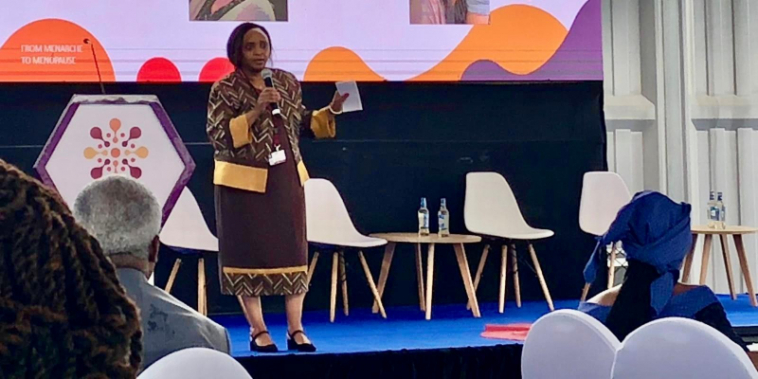Menstrual health and women's rights
Global approaches to menstrual health have evolved significantly in the last 25 years, as this specific women’s health consideration is increasingly informed by the changing landscape of women’s health and rights.

At the recent Nairobi Summit Dr Anne Kihara, President of the African Federation of Gynecology and Obstetrics (AFOG) and FIGO member, joined a session hosted by UNFPA to identify how current trends in menstrual health and menstrual-related disorders can inform the sexual and reproductive health and rights (SRHR) agenda moving forward.
‘From menarche to menopause: maternal health and vaginal bleeding through the reproductive life course’ emphasised menstrual health as a key consideration in establishing universal access to SRHR as part of universal health coverage (UHC).
It also brought home the need for evidence-based and inclusive programmes that integrate and address related challenges and disorders throughout the lifecycle, since menstrual health does not become less important in development and humanitarian settings.
Drawing on her life-long commitment to women’s health and rights as an OBGYN working in Kenya, Dr Kihara focused her presentation on the need to discuss outstanding issues and gaps in our understanding of an issue affecting so many girls and women around the world.
‘Looking beyond menstrual health: How do we address vaginal bleeding throughout the reproductive life course’ is excerpted below:
“We must re-focus efforts on menstrual health, and not only menstrual hygiene management.
Menstrual hygiene management is of course essential, providing information and access, and facilitating use and disposal of sanitary ware during a menstrual period. However, this risks underrating the importance of the broader issues at stake.
Menstrual health management includes systemic and socio-cultural factors which are all integral to development: from nutrition and the environment, to gender, equity, and rights.
A life course approach to menstrual health management is valuable at every stage. Puberty provides the transition period from childhood to adulthood, and there are many challenges associated with woman-hood and motherhood.
Health indicators in Africa increasingly show that our children are grappling with early premarital sexual debut and marriages with increased vulnerability to sexual transmitted diseases and HIV. Rates of teenage pregnancies are made worse by unmet need for modern contraceptives, leading to unplanned pregnancies and unsafe abortion. Obstetric fistulas, psychosocial aberrations from dysfunctional relationships, drug abuse, school dropout rates within a cycle of poverty – all these risks can lead to dejection and stigma at best; worse is severe disability and even death.
Gender disempowerment is a challenge, especially for the girl child - menarche provides an opportunity for knowledge, skills and empowerment.
As OBGYNs, we often encounter abnormal bleeding both in and outside of pregnancy, and reviewing menstrual patterns as normal or abnormal can facilitate health-seeking behaviours. Such information is also critical part of diagnostic workup, helping to identify infections as well as congenital, metabolic, iatrogenic, benign and malignant conditions.
It is our responsibility to screen, diagnose and treat the underlying disease, whilst paying attention to each individual woman’s hygiene and systemic issues. I firmly believe that to ensure comprehensive care, it also our responsibility to empathise with our patients, and to understand the precious red drop that says much more for girls and women.”
As Dr Kihara makes clear, the hopes, dreams and expectations of the 1994 International Conference on Population and Development (ICPD) in Cairo have not yet been fully achieved.
FIGO believes it is essential our efforts are redoubled to finish the uncompleted business of the International Conference on Population and Development (ICPD) Programme of Action, so that the hopes, dreams and expectations of so many girls and women can be achieved.
Read our response to the Nairobi Statement, and learn more about our work to turn commitments into concrete progress that will ensure rights and choices for all.